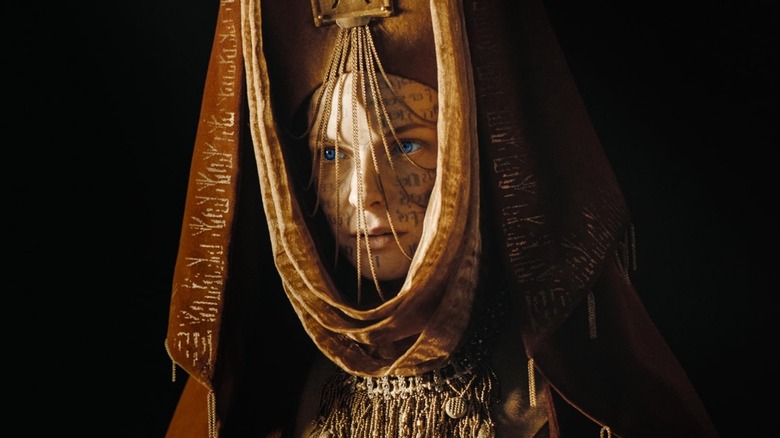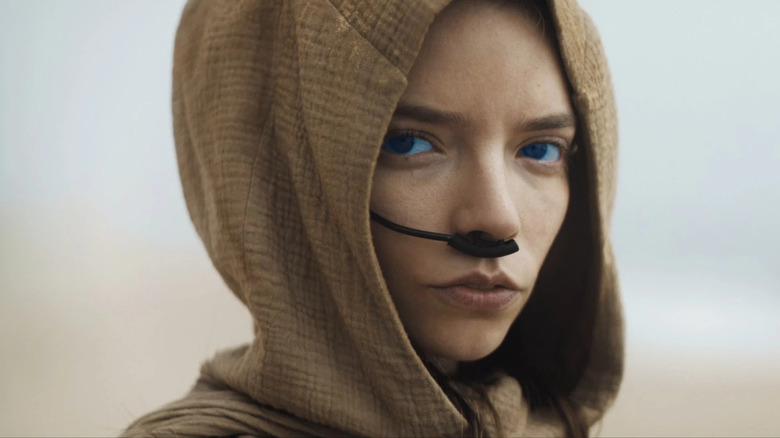Dune 2's Biggest Book Change Happened For A Good Reason
There are plenty of things that the "Dune" franchise gets wrong from Frank Herbert's book. Director Denis Villeneuve is a genius at adaptation, and he is particularly adept at visualizing written science fiction (the "Dune" films aren't even his best sci-fi movies). But he had to make some changes as he went along — one of which was to delete a significant time jump in the middle of the "Dune" novel.
In an interview with the New York Times, the director addressed why he opted for a more condensed timeline, saying, "The idea was to compress the book so that Paul will feel the pressure to get the Fremens' trust, to start gearing up — but not to succeed, not to have the time to create a real war. Time is against him."
One of the major factors driving this pressure cooker is the natural ticking clock of pregnancy. Paul Atreides' (Timothée Chalamet) mother, the Lady Jessica (Rebecca Ferguson), is pregnant throughout the first and second "Dune" films. Villeneuve wanted the story to move quickly to keep the birth of her daughter Alia out of the film. "I think pregnant women look tremendously powerful," the director said. "To use that power was very exciting. And usually when you see a pregnant woman onscreen, she's always giving birth. To avoid that moment, to stay in the state of being pregnant, I thought was very Frank Herbert-like."
Villeneuve opted for a powerful pregnancy over a killer toddler
In the "Dune" book, two years lapse between Paul and Jessica's escape into the deserts of Arrakis and the former's reemergence as the Lisan al Gaib. During that time, Jessica gives birth to her daughter, the eerie Alia Atreides (briefly played by Anya Taylor-Joy in "Dune: Part Two"). In book and movie alike, the child is accidentally impacted by Jessica's imbibition of the Water of Life.
In the book, we see the child born and toddling around in what can only be described as a terrifyingly creepy form. She is briefly involved in the first "Dune" story — and in some really wild ways. For instance, she's the one who kills Baron Vladimir Harkonnen (Stellan Skarsgård) with a Gom Jabbar needle. She also earns the name "St. Alia of the Knife" as she runs around slaughtering dying soldiers on the battlefield.
Alia continues to factor into the story as it progresses from there to "Dune: Messiah" and beyond. In Denis Villeneuve's adaptation, though, she only makes a brief, grown-up appearance in a vision and is otherwise only shown disturbingly chatting with her mother in utero.
Villeneuve is proud of his biggest book change
Opting to keep Alia more or less out of the first two films feels like a long-term play. It's similar to Villeneuve barely showing the worms of Arrakis in "Dune: Part One" before unleashing their full potential in the next film. Perhaps he's holding his cards close to the chest regarding Alia, only to reveal more in a third film (not that fans should expect "Dune: Part Three" any time soon).
Nevertheless, the director is satisfied with his changes to the source material. In the New York Times interview, he explained that he was pleased to pivot away from the killer toddler concept, saying, "I thought that was more fresh and original. Honestly, it's one of the things that I'm proudest of in the adaptation."
Villeneuve reiterated his pride in this alteration to Entertainment Weekly, noting that Jessica talking to her daughter while Alia was still in her womb was particularly useful in demonstrating Alia's transformation and the power of the Water of Life. "When we had this idea, it was like an epiphany for me. It was one of the final bricks of the screenplay," he said, adding a bit later, "I felt that it was very close to the spirit of the book. I'm very happy with this idea."


